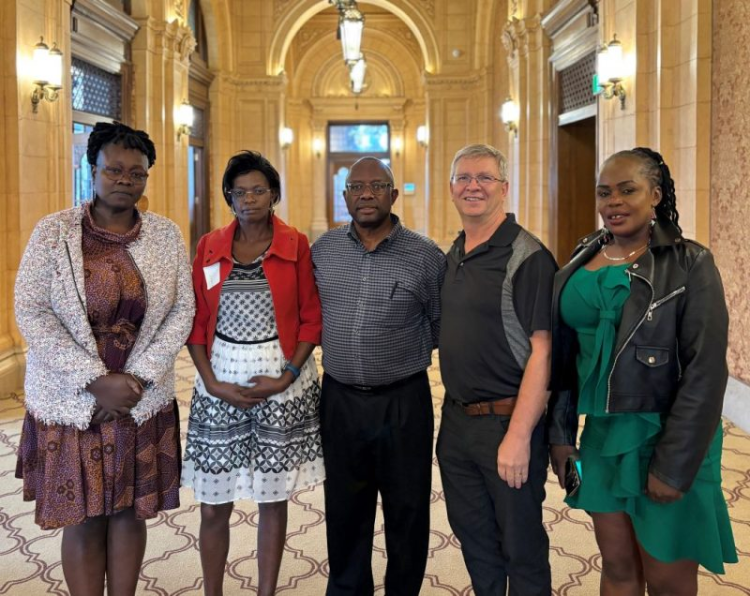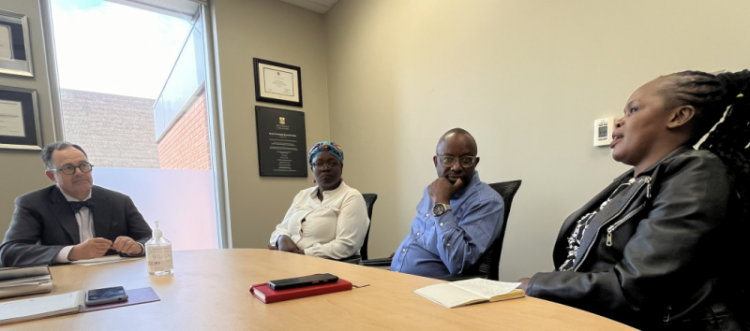Joyce Adhiambo has lived with HIV for the past 24 years, and she depends on antiretroviral (ARV) drugs to keep her alive.
She was shocked when she found out that United States President Donald Trump's administration was cutting the Sex Worker Outreach Program's (SWOP) $1.6 million USD in funding through the U.S. President's Emergency Plan for AIDS Relief.
SWOP, which UM has helped operate since 2008, provides HIV treatment to Adhiambo and thousands of other people in Nairobi, Kenya.
"Without ARVs, some of us will definitely die. We are really, really in need because we don't want to lose our fellow sex workers," said Adhiambo, who was in Winnipeg for meetings at the end of September with three other SWOP peer leaders, and the physician in charge of the program, Dr. Joshua Kimani.

[From left to right] Joyce Adhiambo, Emily Kimemia, Dr. Joshua Kimani, Dr. Keith Fowke and Veronica Were attended meetings at the Fort Garry Hotel while in Winnipeg.
Dr. Keith Fowke, professor and department head of medical microbiology and infectious diseases, Max Rady College of Medicine, Rady Faculty of Health Sciences, said UM and the Rady Faculty are providing financial support to put a temporary plan in place to keep the program running after the loss of aid on Sept. 29.
Fowke said the emergency funding will allow them to keep five of 10 clinics open with a reduced staff. One clinic will stay open for 12 months, and four clinics will remain open for three months while the SWOP team works to secure funding to reopen all the clinics.
"We're hitting on every front we can - from philanthropy to research grants and clinical trials to manufacturers and other donations. So, it's going to take a number of different approaches to keep the program running," Fowke said.
Kimani said the SWOP clinics serve about 50,000 patients, who include sex workers, gay-bisexual men who have sex with men and transgender individuals. He said that while the clinics that remain open will focus on the 5,000 patients on ARVs, SWOP's HIV prevention work will suffer.
"You don't close the tap by just doing treatment. You close the tap by prevention and treatment. Prevention is important, and it's more expensive," Kimani said.
Emily Kimemia, a SWOP peer educator and peer leader, said her work bridges the gap between the community and the clinics by providing education and HIV prevention services.
"Because of the poverty level, the clinics mean a lot to them since they get everything for free, like condoms, treatment and ARVs. We all know that once you take care of one community member, you've taken care of a lot of families, because she has a lot of clients," Kimemia said while in Winnipeg.
Kimemia and Adhiambo said they're concerned for patients who will now have to seek medical care at other health-care facilities in Nairobi because of the stigma and discrimination they face.
"SWOP has changed people's lives," Adhiambo said. "The program has created a safe space for all of us because sex workers are a marginalized community, and when we go to the program, we feel safe, and we feel secure. It is a home for some of us."

Dr. Peter Nickerson, vice-provost (health sciences) and dean of Rady Faculty of Health Sciences, (left) meets with (from left to right) Joyce Adhiambo, Dr. Joshua Kimani and Veronica Were.
Not only will the program cuts impact the care patients receive, Fowke said it will be devastating to UM's research projects. UM is a partner with the Partners for Health and Development in Africa, a Nairobi-based non-governmental organization, and they enroll patients from the SWOP clinics in research studies.
"It's a real symbiotic relationship where the community can benefit from having good clinical care in an area that would otherwise be underserved. And as researchers, we have access to research participants who tell us what their priorities are, and then we can follow up and design research programs," Fowke said.
Without access to research participants, it will be more challenging to attract funding for future projects, Fowke added.
"It's always dark before dawn," Kimani said. "So maybe this is the darkest point, but the sun will come out still, and hopefully things will get better."










